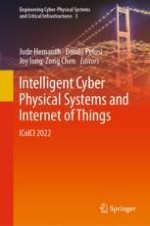2023 | OriginalPaper | Chapter
Privacy Threat Reduction Using Modified Multi-line Code Generation Algorithm (MMLCGA) for Cancelable Biometric Technique (CBT)
Authors : Pramod D. Ganjewar, Sanjeev J. Wagh, Aarti L. Gilbile
Published in: Intelligent Cyber Physical Systems and Internet of Things
Publisher: Springer International Publishing
Activate our intelligent search to find suitable subject content or patents.
Select sections of text to find matching patents with Artificial Intelligence. powered by
Select sections of text to find additional relevant content using AI-assisted search. powered by
